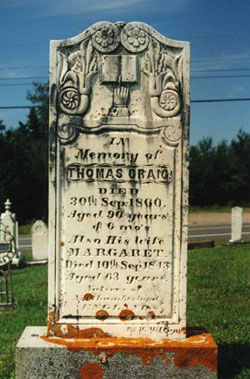

Elliott, Bruce, 2004-2005: Emigrant Recruitment by the New Brunswick Land
Company: The Pioneer Settlers of Stanley and Harvey.********************************************************************************
Despite his comparative poverty, Thomas Craigs was a respected elder in Wooler West Chapel, and following his departure his minister published a biographical sketch of the elderly emigrant in a Presbyterian magazine. He included the text of the sermon delivered on the eve of Craigs's departure (on the text "The Lord said unto Abraham, get thee out of thy country and from thy kindred and from thy father's house, unto the land that I will show thee"), and a letter Craigs wrote from Harvey in July 1841. The biography was subsequently reissued as a pamphlet. Though intended to promote piety rather than emigration, the publication also highlighted the courage and resourcefulness of 71-year-old Craigs, who had gone to Harvey with his wife and two youngest children to join the sons who had come on the Cornelius four years earlier. For us it is an informative document that discloses one means by which poor emigrants financed their passage, how they could reach New Brunswick after emigrant ships no longer called at Berwick, and the importance of the Scots religion to these residents of an English county where the ecclesiastical establishment was Anglican.
Born in Lanton, Northumberland in 1770, Thomas Craigs became, like his father Walter before him, a weaver at Milfield in Kirknewton parish. From childhood he attended the Scotch Church in Wooler known as Wooler West Chapel. He was for thirty years an elder and precentor (clerk) of the congregation, as well as a Sabbath-school teacher, and weekly he walked the 12 miles each way from Milfield to attend worship. A year before he emigrated he was presented by the congregation with a suit of clothes, a psalm book, and a pair of silver spectacles; the glasses are still in the hands of the family.
Gravestone to Presbyterian elder Thomas Craigs, who came out to join his sons at Harvey in 1841. Source : Bruce S. Elliott (2002 image).
Medium sized pop up image
700 X 1062 72 dpi 256 k
Full sized pop up image
2347 X 1547 400 dpi 1000 k
The weaving trade "at no time lucrative, was becoming daily more precarious" and he was persuaded by his sons to join them in Harvey. As he could not afford the fare he followed local precedent and raffled off a clock at a shilling a ticket. He succeeded in raising £8. When the winner, an army officer, learned of the old man's intentions he made him a present of the clock. The congregation then took up a subscription to supplement this, and paid the passages of Craigs, his wife, son, and daughter, and the costs of conveying them with their possessions to Liverpool. A gentleman of the congregation supplied horses and a servant to accompany them as far as Berwick. They sailed from there to Newcastle, and then travelled by rail to Carlisle and on to Liverpool. They were received cordially by the mayor, to whom their minister had sent a letter of introduction, and he found them berths on a timber trader, the Glengarry, bound for Saint John. After five weeks and four days at sea, they arrived in New Brunswick. The day after reaching Harvey, and having walked the 25 miles from Fredericton, Craigs trudged five miles to the nearest church and, in the absence of a minister, delivered an extemporaneous sermon: an impressive accomplishment for a man of 71.(118) The Rev. Daniel McCurdy, an itinerant Presbyterian, had begun visiting Harvey Settlement the year before, (119) and Craigs became a member of his congregation. He lived another 20 years, a respected elder in the new world as in the old.
_________________________________________________________________________
(118) Rev. Thomas Gray, Sketch of the Life of Mr Thomas Craigs, lately elder and precentor in the Scottish Church, Wooler, Northumberland, extracted from the Scottish Christian Herald, Second Series, Vol. III, No. 153, p. 771, &c (Edinburgh: John Johnstone, 1842). Typescript in Berwick-upon-Tweed Record Office, C4/27. The vessel was identified by Helen Craig from the details given in two letters from Craigs appended to his biography. Helen C. Craig, The Craigs of Harvey Settlement, Red Rock and the Pontiac (1999), 6. Craigs' parentage was identified in 2002 by Tony Brown of Beal, Berwick, a descendant of Thomas's brother Luke, who remained in Britain.
(119) Heather Long, "Rev. Daniel McCurdy's Baptisms and Marriages of 1834-1854", Generations 21, no. 4 (Winter 1999): 46-51 prints the baptisms and marriages of the Harvey settlers from McCurdy's register at the Public Archives of Nova Scotia. The marriage entries are incomplete. From 1856 onward the registers of Harvey United Church pertain to this Presbyterian congregation: PANB, reel F65.
